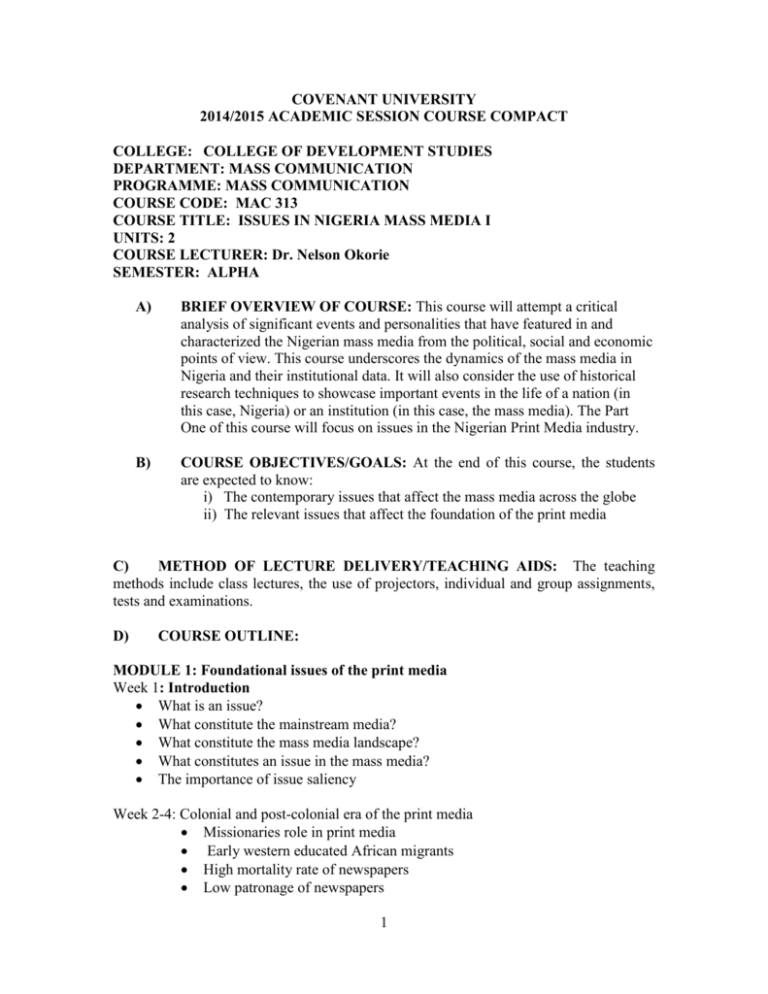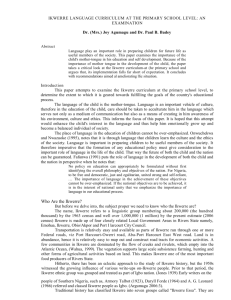COVENANT UNIVERSITY 2014/2015 ACADEMIC SESSION
advertisement

COVENANT UNIVERSITY 2014/2015 ACADEMIC SESSION COURSE COMPACT COLLEGE: COLLEGE OF DEVELOPMENT STUDIES DEPARTMENT: MASS COMMUNICATION PROGRAMME: MASS COMMUNICATION COURSE CODE: MAC 313 COURSE TITLE: ISSUES IN NIGERIA MASS MEDIA I UNITS: 2 COURSE LECTURER: Dr. Nelson Okorie SEMESTER: ALPHA A) BRIEF OVERVIEW OF COURSE: This course will attempt a critical analysis of significant events and personalities that have featured in and characterized the Nigerian mass media from the political, social and economic points of view. This course underscores the dynamics of the mass media in Nigeria and their institutional data. It will also consider the use of historical research techniques to showcase important events in the life of a nation (in this case, Nigeria) or an institution (in this case, the mass media). The Part One of this course will focus on issues in the Nigerian Print Media industry. B) COURSE OBJECTIVES/GOALS: At the end of this course, the students are expected to know: i) The contemporary issues that affect the mass media across the globe ii) The relevant issues that affect the foundation of the print media C) METHOD OF LECTURE DELIVERY/TEACHING AIDS: The teaching methods include class lectures, the use of projectors, individual and group assignments, tests and examinations. D) COURSE OUTLINE: MODULE 1: Foundational issues of the print media Week 1: Introduction What is an issue? What constitute the mainstream media? What constitute the mass media landscape? What constitutes an issue in the mass media? The importance of issue saliency Week 2-4: Colonial and post-colonial era of the print media Missionaries role in print media Early western educated African migrants High mortality rate of newspapers Low patronage of newspapers 1 Early style of journalism in Nigeria Liberation struggle Nnamdi Azikiwe - New style of journalism - The birth of West African Pilot Herbert Macaulay Obafemi Awolowo Independence and partisan politics Bifurcated media Issues of ethnicity in the print media Week 5-6:Military invasion and the Nigerian press Era of the military - Military coups in Nigeria - 29 years of military rule in Nigeria ( 1966-1999) The second struggle of the press - Decrees against press freedom - Proscription of newspapers - Death of Dele Giwa/ Proscription of NewsWatch - Imprisonment of Journalists - Journalists’ call for democracy Week 7: Journalism Standards and Issues Ethical Standards of Journalism Ethical Issues affecting Journalism Junketing Moon Lighting Yellow Journalism Afghanistanism Brown Envelope News Commercialization The print media as a voice and shield for politicians - The Sun newspaper / Uzor Kalu - The Nation/ Ahmed Bola Tinubu - National Mirror/ Ibrahim Jumoh - Compass/ Gbenga Daniels MODULE 2: Contemporary issues of the Nigerian mass media Week 8: Economic logic versus civic responsibility - Two faces of contradiction- development and commercialization - Urban media and the rural majority e.g. Silverbird Week 9: Terrorism, national security and the print media 2 MODULE 3: Foundational Issues of the electronic media Week 10: The establishment of WNBC/WNTV in Nigeria Week 11: The proliferation of electronic media outlets in Nigeria Decree 38 of 1992 Deregulation and the establishment of AIT and Ray Power MODULE 4: PRACTICALS Week 12 -13: Group assignments and presentations E) TUTORIALS: Tutorials may not be held for this course. F) STRUCTURE OF THE PROGRAMME/ METHOD OF GRADING: The final marks for each student are a combination of the continuous assessment (CA) tests and the written examination at the end of the semester. The CA totals 30%. The written examination is 70%. S/n Grade Components Marks 1 Continuous assessment Class test 10 Class assignment 10 Group test 10 2 Examination 70 3 Total 100 G) GROUND RULES AND REGULATIONS: Students are expected to a Attend all classes and on time . On time means not later than ten minutes from the beginning of the class. ii) Hand in all assignments promptly. iii) Conduct themselves in an orderly manner. iv) Be dress code complaint i) H) TOPICS FOR TERM PAPERS/ASSIGNMENTS/STUDENT ACTIVITIES: Students will be given individual and group assignments I) ALIGNMENT WITH COVENANT UNIVERSITY VISION/GOALS: This course aligns with the University vision of producing experts in mass media studies J: CONTEMPORARY ISSUES/INDUSTRY RELEVANCE: This course is part of the training process that will produce experts in the media industry. It is essential all students understand the relevant issues that affect the mass media. REFERENCES 1. Okorie Nelson (2010). Press Freedom in Nigeria: Legal Constraints and Possible solutions. The International Journal of Communication, Enugu: Department of Mass Communication, University of Nigeria, Nsukka.11(1), 159-173 3 2. Adeyemi Aderogba and Okorie Nelson (2010). Perception of the Brown envelope syndrome by Journalists in South West Nigeria. The Nigerian Journal of Communication, African Council for Communication Educators, Department of Communication Art, Uyo. 8(1), 14-26. 3. Ngoa, N,S.(2012). Issues in Nigeria Mass Media: Politics, the Military and a Survivor Ethnic Press. Journal of Communication and Media Research, 4(1), 114 4. Adeyemi Aderogba.(2013). Nigerian Media practitioners and Ethical Values: Media Audience Assessment. Journal of Emerging Trends in Educational Research and Policy Studies, 4(2), 215-222 4








